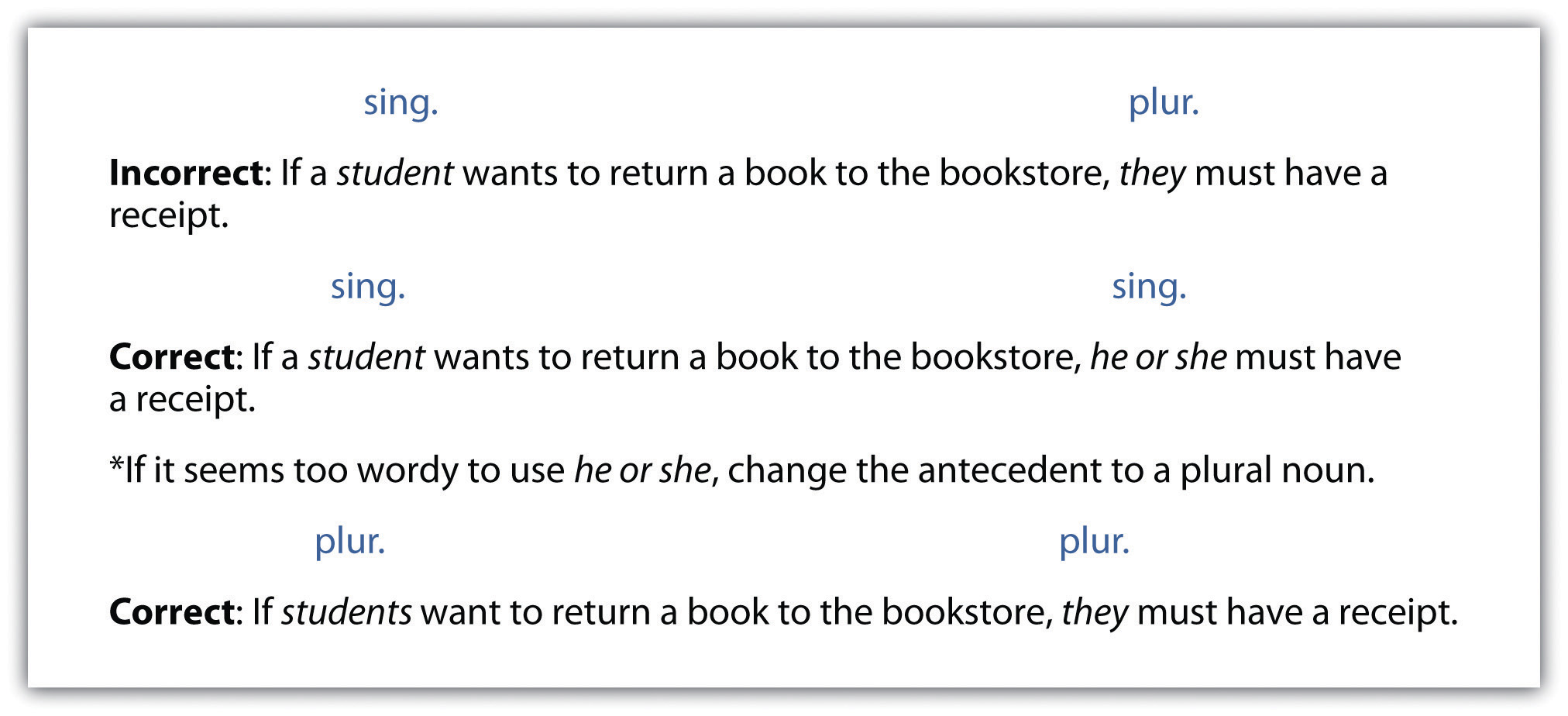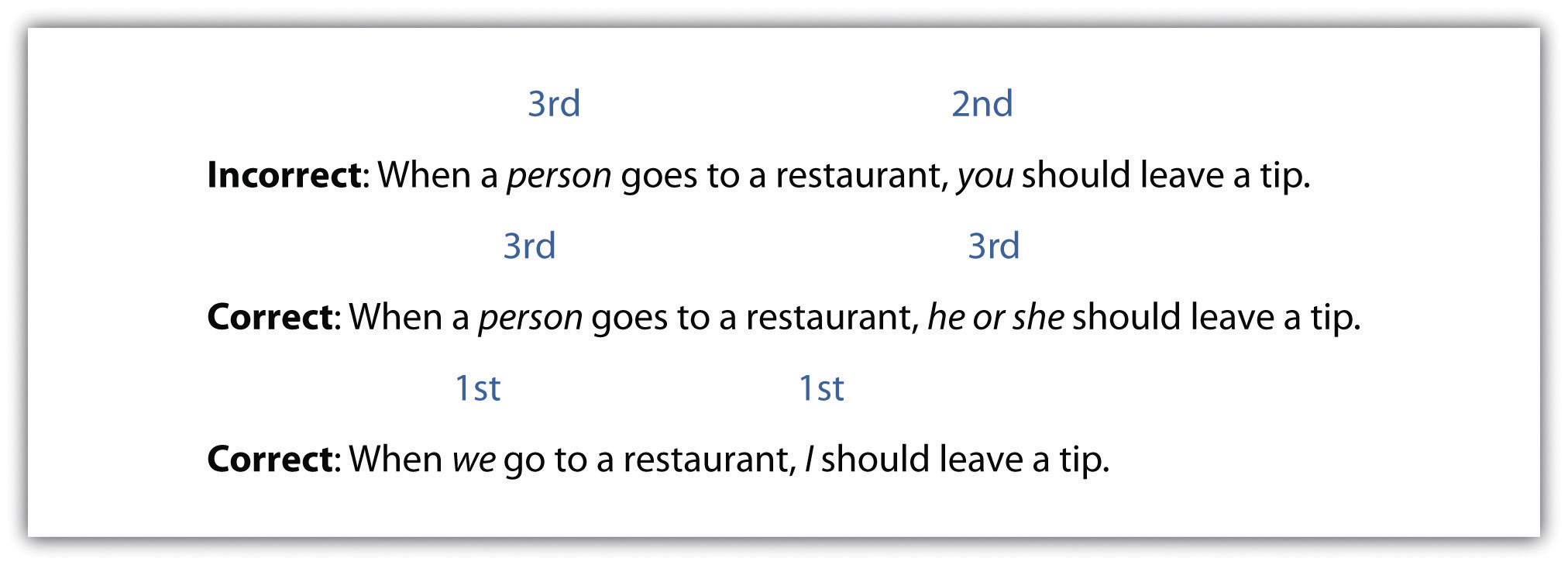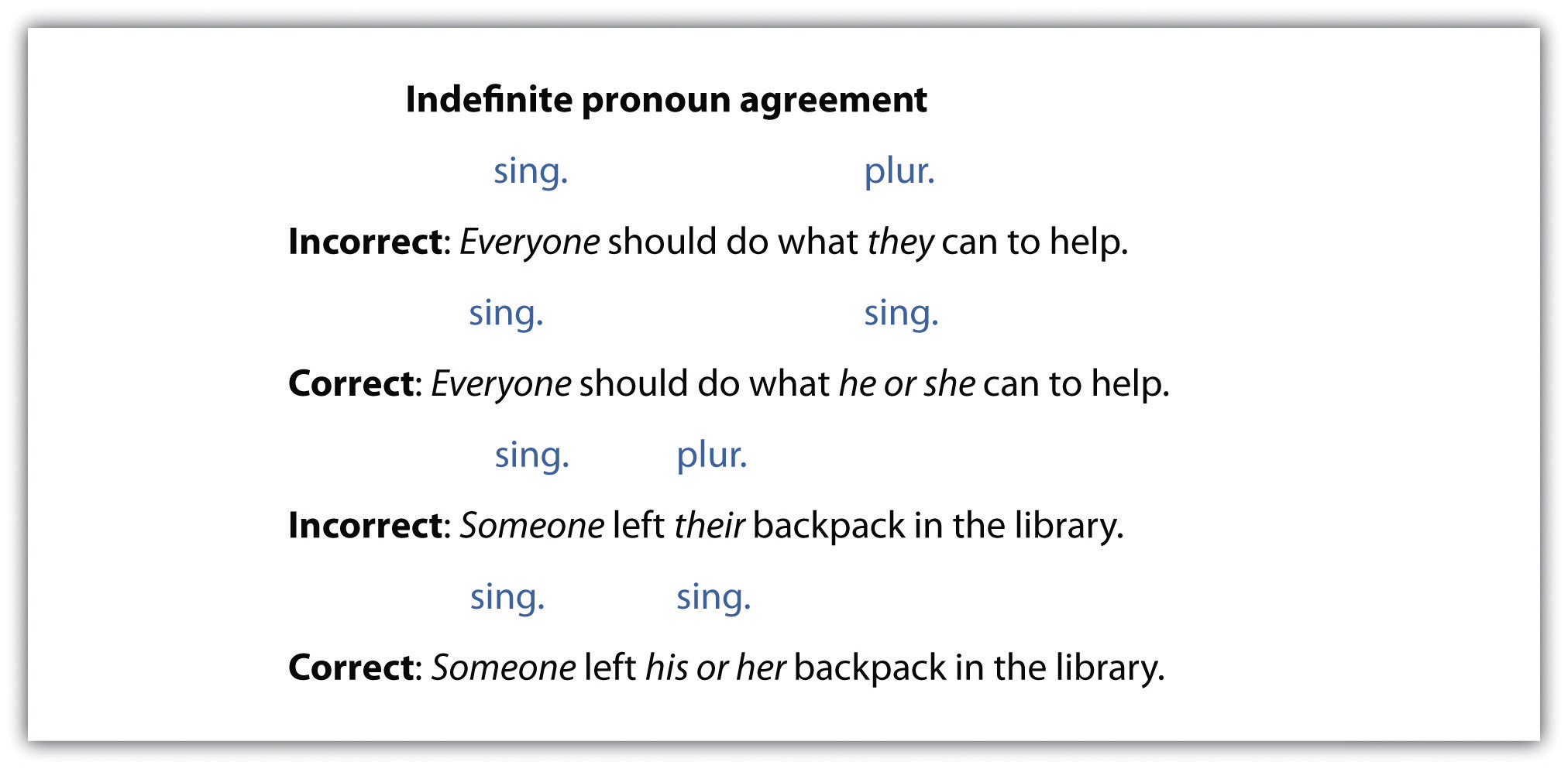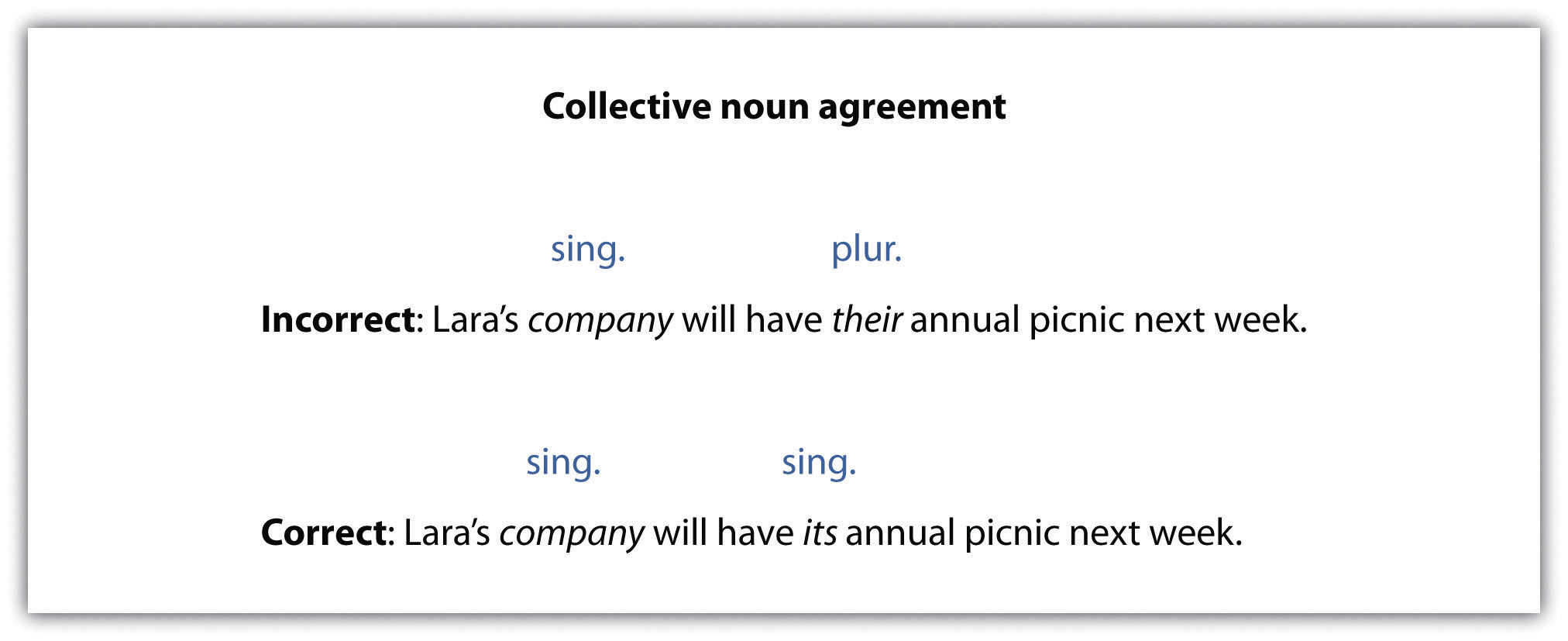This is “Pronouns”, section 2.5 from the book Successful Writing (v. 1.0). For details on it (including licensing), click here.
For more information on the source of this book, or why it is available for free, please see the project's home page. You can browse or download additional books there. To download a .zip file containing this book to use offline, simply click here.
2.5 Pronouns
Learning Objectives
- Identify pronouns and their antecedents.
- Use pronouns and their antecedents correctly.
If there were no pronouns, all types of writing would be quite tedious to read. We would soon be frustrated by reading sentences like Bob said that Bob was tired or Christina told the class that Christina received an A. Pronouns help a writer avoid constant repetition. Knowing just how pronouns work is an important aspect of clear and concise writing.
Pronoun Agreement
A pronounA word that substitutes for a noun; for example, I, you, he, she, it, we, or they. is a word that takes the place of (or refers back to) a noun or another pronoun. The word or words a pronoun refers to is called the antecedentThe noun that a pronoun refers to. of the pronoun.
-
Lani complained that she was exhausted.
- She refers to Lani.
- Lani is the antecedent of she.
-
Jeremy left the party early, so I did not see him until Monday at work.
- Him refers to Jeremy.
- Jeremy is the antecedent of him.
-
Crina and Rosalie have been best friends ever since they were freshman in high school.
- They refers to Crina and Rosalie.
- Crina and Rosalie is the antecedent of they.
Pronoun agreementWhen the pronoun and the antecedent match or agree with each other. errors occur when the pronoun and the antecedent do not match or agree with each other. There are several types of pronoun agreement.
Agreement in Number
If the pronoun takes the place of or refers to a singular noun, the pronoun must also be singular.

Agreement in Person
| Singular Pronouns | Plural Pronouns | |||||
|---|---|---|---|---|---|---|
| First Person | I | me | my (mine) | we | us | our (ours) |
| Second Person | you | you | your (yours) | you | you | your (your) |
| Third Person | he, she, it | him, her, it | his, her, its | they | them | their (theirs) |
If you use a consistent person, your reader is less likely to be confused.

Exercise 1
Edit the following paragraph by correcting pronoun agreement errors in number and person.
Over spring break I visited my older cousin, Diana, and they took me to a butterfly exhibit at a museum. Diana and I have been close ever since she was young. Our mothers are twin sisters, and she is inseparable! Diana knows how much I love butterflies, so it was their special present to me. I have a soft spot for caterpillars too. I love them because something about the way it transforms is so interesting to me. One summer my grandmother gave me a butterfly growing kit, and you got to see the entire life cycle of five Painted Lady butterflies. I even got to set it free. So when my cousin said they wanted to take me to the butterfly exhibit, I was really excited!
Indefinite Pronouns and Agreement
Indefinite pronounsDoes not refer to a specific person or thing and is usually singular. do not refer to a specific person or thing and are usually singular. Note that a pronoun that refers to an indefinite singular pronoun should also be singular. The following are some common indefinite pronouns.
| Common Indefinite Pronouns | ||||
|---|---|---|---|---|
| all | each one | few | nothing | several |
| any | each other | many | one | some |
| anybody | either | neither | one another | somebody |
| anything | everybody | nobody | oneself | someone |
| both | everyone | none | other | something |
| each | everything | no one | others | anyone |

Collective Nouns
Collective nounsA noun that identifies more than one person, place, or thing and treats those people, places, or things as a singular unit. suggest more than one person but are usually considered singular. Look over the following examples of collective nouns.
| Common Collective Nouns | ||
|---|---|---|
| audience | faculty | public |
| band | family | school |
| class | government | society |
| committee | group | team |
| company | jury | tribe |

Exercise 2
Complete the following sentences by selecting the correct pronoun. Copy the completed sentence onto your own sheet of paper. Then circle the noun the pronoun replaces.
- In the current economy, nobody wants to waste ________ money on frivolous things.
- If anybody chooses to go to medical school, ________ must be prepared to work long hours.
- The plumbing crew did ________ best to repair the broken pipes before the next ice storm.
- If someone is rude to you, try giving ________ a smile in return.
- My family has ________ faults, but I still love them no matter what.
- The school of education plans to train ________ students to be literacy tutors.
- The commencement speaker said that each student has a responsibility toward ________.
- My mother’s singing group has ________ rehearsals on Thursday evenings.
- No one should suffer ________ pains alone.
- I thought the flock of birds lost ________ way in the storm.
Subject and Object Pronouns
Subject pronounsPronoun that functions as the subject in a sentence. function as subjects in a sentence. Object pronounsPronoun that functions as the object of a verb or a preposition. function as the object of a verb or of a preposition.
| Singular Pronouns | Plural Pronouns | ||
|---|---|---|---|
| Subject | Object | Subject | Object |
| I | me | we | us |
| you | you | you | you |
| he, she, it | him, her, it | they | them |
The following sentences show pronouns as subjects:
- She loves the Blue Ridge Mountains in the fall.
- Every summer, they picked up litter from national parks.
The following sentences show pronouns as objects:
- Marie leaned over and kissed him.
- Jane moved it to the corner.
Tip
Note that a pronoun can also be the object of a preposition.
Near them, the children played.
My mother stood between us.
The pronouns us and them are objects of the prepositions near and between. They answer the questions near whom? And between whom?
Compound subject pronounsTwo or more pronouns joined by a conjunction or preposition that function as the subject of the sentence. are two or more pronouns joined by a conjunction or a preposition that function as the subject of the sentence.
The following sentences show pronouns with compound subjects:
Incorrect: Me and Harriet visited the Grand Canyon last summer.
Correct: Harriet and I visited the Grand Canyon last summer.
Correct: Jenna accompanied Harriet and me on our trip.
Tip
Note that object pronouns are never used in the subject position. One way to remember this rule is to remove the other subject in a compound subject, leave only the pronoun, and see whether the sentence makes sense. For example, Me visited the Grand Canyon last summer sounds immediately incorrect.
Compound object pronounsTwo or more pronouns joined by a conjunction or preposition that function as the object of the sentence. are two or more pronouns joined by a conjunction or a preposition that function as the object of the sentence.
Incorrect: I have a good feeling about Janice and I.
Correct: I have a good feeling about Janice and me.
Tip
It is correct to write Janice and me, as opposed to me and Janice. Just remember it is more polite to refer to yourself last.
Writing at Work
In casual conversation, people sometimes mix up subject and object pronouns. For instance, you might say, “Me and Donnie went to a movie last night.” However, when you are writing or speaking at work or in any other formal situation, you need to remember the distinctions between subject and object pronouns and be able to correct yourself. These subtle grammar corrections will enhance your professional image and reputation.
Exercise 3
Revise the following sentences in which the subject and object pronouns are used incorrectly. Copy the revised sentence onto your own sheet of paper. Write a C for each sentence that is correct.
-
Meera and me enjoy doing yoga together on Sundays.
________________________________________________________________
-
She and him have decided to sell their house.
________________________________________________________________
-
Between you and I, I do not think Jeffrey will win the election.
________________________________________________________________
-
Us and our friends have game night the first Thursday of every month.
________________________________________________________________
-
They and I met while on vacation in Mexico.
________________________________________________________________
-
Napping on the beach never gets boring for Alice and I.
________________________________________________________________
-
New Year’s Eve is not a good time for she and I to have a serious talk.
________________________________________________________________
-
You exercise much more often than me.
________________________________________________________________
-
I am going to the comedy club with Yolanda and she.
________________________________________________________________
-
The cooking instructor taught her and me a lot.
________________________________________________________________
Who versus Whom
Who or whoever is always the subject of a verb. Use who or whoever when the pronoun performs the action indicated by the verb.
Who won the marathon last Tuesday?
I wonder who came up with that terrible idea!
On the other hand, whom and whomever serve as objects. They are used when the pronoun does not perform an action. Use whom or whomever when the pronoun is the direct object of a verb or the object of a preposition.
Whom did Frank marry the third time? (direct object of verb)
From whom did you buy that old record player? (object of preposition)
Tip
If you are having trouble deciding when to use who and whom, try this trick. Take the following sentence:
Who/Whom do I consider my best friend?
Reorder the sentence in your head, using either he or him in place of who or whom.
I consider him my best friend.
I consider he my best friend.
Which sentence sounds better? The first one, of course. So the trick is, if you can use him, you should use whom.
Exercise 4
Complete the following sentences by adding who or whom. Copy the completed sentence onto your own sheet of paper.
- ________ hit the home run?
- I remember ________ won the Academy Award for Best Actor last year.
- To ________ is the letter addressed?
- I have no idea ________ left the iron on, but I am going to find out.
- ________ are you going to recommend for the internship?
- With ________ are you going to Hawaii?
- No one knew ________ the famous actor was.
- ________ in the office knows how to fix the copy machine?
- From ________ did you get the concert tickets?
- No one knew ________ ate the cake mom was saving.
Key Takeaways
- Pronouns and their antecedents need to agree in number and person.
- Most indefinite pronouns are singular.
- Collective nouns are usually singular.
- Pronouns can function as subjects or objects.
- Subject pronouns are never used as objects, and object pronouns are never used as subjects.
- Who serves as a subject of a verb.
- Whom serves as an object of a sentence or the object of a preposition.
Writing Application
Write about what makes an ideal marriage or long-term relationship. Provide specific details to back up your assertions. After you have written a few paragraphs, go back and proofread your paper for correct pronoun usage.




